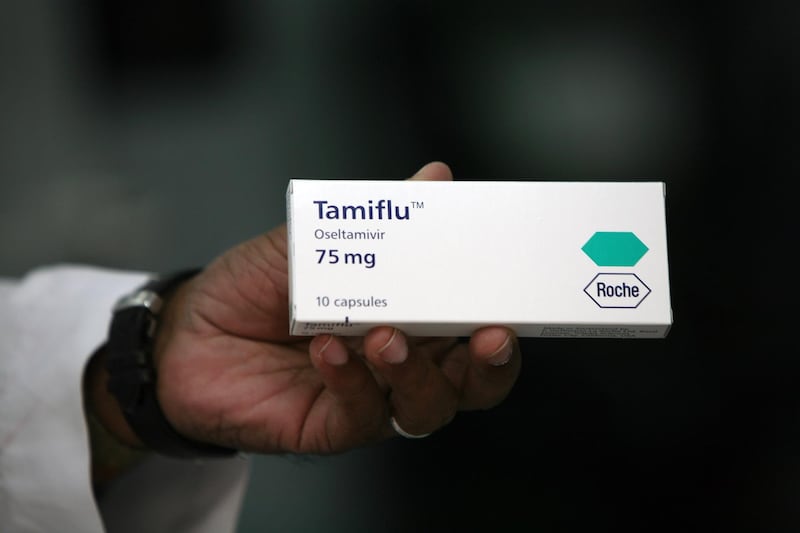Pharmacies said they are running low on anti-flu tablets after many residents caught the virus early this winter.
Staff said Tamiflu tablets are in high demand this year and that the liquid version given to children was no longer stocked in the Emirates.
Hospital pharmacies are said to have better stocks as they make bulk purchases ahead of the cold season.
Pharmacies told The National that Tamiflu tablets were in higher demand because the liquid form was not licensed for sale by authorities this year.
The tablets can be changed into liquid form for customers by pharmacists.
"[The liquid form of] Tamiflu cannot be found in the whole of the UAE," said a pharmacist at City Pharmacy Co, a medical distributor in the Emirates.
“It is not registered [by the Ministry of Health and Prevention] in the UAE at this time and has not been throughout the whole year.”
Tamiflu is an anti-viral medicine that attacks the flu virus and is best taken in the first two days of feeling ill.
It is not the same as the flu vaccine, which has many brand names and which the government urged all residents to consider earlier this year, particularly children, the elderly and people with existing medical conditions.
Another pharmacist at Sheikh Khalifa Medical City Hospital in Abu Dhabi said it had not stocked the liquid form of Tamiflu for "quite a while".
“We received an email from our management some time back saying it is no longer available for distribution,” she said.

“If we get a prescription for this type of medication, we prepare it as a compounding recipe, using Tamiflu 75mg capsules."
To avoid mistakes during the process of compounding and dosing, pharmacists follow strict guidelines set by the Ministry of Health and Prevention when preparing the oral suspension alternative.
"We can only prepare the compounding recipe once we have a valid prescription from a registered UAE doctor," she said.
An Aster Pharmacy employee in Abu Dhabi said they ran out of Tamiflu tablets two weeks ago.
“We are advising people to take their prescription to our hospital pharmacies, which are fully stocked,” the pharmacist said.
The National also contacted a number of Life Pharmacy branches in Abu Dhabi and was told the medicine was not available. The pharmacy, however, confirmed that a number of its Dubai branches had capsules in stock.
What is flu and what causes it?
If you have a dry throat, stuffy nose, keep sneezing and feel like you've swallowed a cheese grater, chances are you've got a common cold – not flu.
Less prevalent is full-blown flu – a virus that leaves your body feverish and your limbs aching for a week or more.
Countries across the globe have a "flu season" in which the virus spreads. About five million serious cases are recorded each year.
Only in the past decade or so have scientists begun to come up with answers as to why. One theory is that the cold weather wears down the body's defences against infection, while the shorter days reduce your intake of vitamin C.
And western researchers often point to spending more time indoors with other people and taking public transport.
None of the three above would fit the UAE's climate or environment.
But as a major winter destination for visitors, the country feels the impact of flu in the cooler months as tourist numbers increase.
Further still, the exodus of families for Christmas and their return in January may bring more sick days and missed school lessons.
And the large number of UAE residents who travel for work frequently could be another factor in flu's foothold here.







